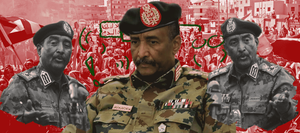Since we last wrote on Sudan, the country's civilian prime minister resigned and the military junta has extended and consolidated its position. It promised a national dialogue to reset the Sudanese path to a democratic transition, but the dialogue was postponed. Partially as a result, the Sudanese people are back in the streets, bravely protesting for an end to martial law.
We've decided to re-run our last Insight on the situation in Sudan, which breaks down a basic problem in the fight against dictatorship and authoritarianism—those who control military power often cling tighter to power and exercise greater brutality, if they aren't given "get out of jail free" cards. While some of the time-sensitive information in the piece is no longer up to date, the theory articulated remains highly useful for understanding the dynamics of political conflict in authoritarian countries.
It appears—for the moment, at least—that the Sudanese military’s successful coup d’etat is no longer so successful.
Spectacles covered the military coup a few weeks ago, but a quick recap for unfamiliar readers is in order. About two years ago, longtime Sudanese dictator Omar al-Bashir was overthrown with the help of the military following widespread protests. Until recently, a joint civilian-military transitional government, known as the Sovereignty Council, was tasked with running the country and ostensibly steering it towards democratic elections in 2023. It faced challenges in the form of inflation and tensions between its military and civilian components, but there was some reason to be optimistic about its success.
Just a few weeks ago, however, Lt. General Abdel Fattah al-Burhan, the leader of the Council since its establishment, arrested civilian leadership, including Sudan’s Prime Minister Abdalla Hamdok, and dissolved the Sovereignty Council. The action was met with a wave of protest by Sudanese citizens, who have shown tremendous courage and tenacity in their fight to maintain the country’s path to democracy.
And their dedication has worked, at least to some extent. Over the weekend, Mr. Burhan released Mr. Hamdok and restored him as Sudan’s prime minister. The details of the arrangement are still somewhat unclear, but there’s no doubt that—given the possible alternative of continued despotic military rule—it’s an encouraging development.
Not all Sudanese citizens are satisfied, however. As The New York Times reports, some major opposition factions have not given the return to joint civil-military rule their stamp of approval. They, and many citizens who continue to protest in the streets, believe that military rule should be done away with entirely at this point. Their logic makes a great deal of sense—Mr. Burhan showed his hand by ending civilian rule, and there’s no guarantee that as long as he and his allies in the military continue to hold the cards, something like last month’s coup won’t happen again.
But there’s a dilemma here, too. Some of the tensions that led to the coup were rooted in the implication of several military leaders, including Mr. Burhan, in major human rights violations. Civilian leaders, for example, seemed prepared to turn Sudan’s previous dictator over to the International Criminal Court for atrocities committed in Sudan’s Darfur region in the 2000s, during which time he was the country’s ruler. Mr. Burhan was a commander in the region at that time and could easily be implicated. Similarly, some other current military leaders may bear responsibility for the killing of protestors during the movement against Mr. Bashir’s dictatorship in the summer of 2019. The problem for those unsatisfied with the new arrangement between Mr. Burhan and Mr. Hamdok, then, is that the military both retains its capacity for coercion and has particularly potent motivations for not wanting to cede control.
For better or worse, this is hardly an unusual dilemma in countries experiencing transitions away from dictatorial rule. Despots unaccountable to the populations over which they rule often exercise extraordinary force against them. At the same time, the more brutal dictators are in their repression, the more cause they and the military figures who serve them have to avoid resentful civilians gaining power. For those civilians who do eventually come to power, the question of how to treat previous leaders, whether or not to offer immunity or some kind of off-ramp to exile unmolested, looms large.
It’s hard to imagine that the Sudanese military will happily hand over power to a civilian government, much less a democratically elected civilian government, by 2023, unless Mr. Burhan and his cronies have explicit guarantees that they will be safe from prosecution. But it’s also true that twice in the past two years, the Sudanese people have, by way of protest, forced out despotic rulers. Maybe those opposed to the return to joint civil-military rule are right—compromise is in this case a form of moral corruption that the people need not accept.
There’s no clear solution here; only time will tell. But those of us who care about democracy must remember the dilemma at play in Sudan—that fear of true democratic accountability might drive those who hold the guns to be all the more tenacious in refusing to give them up.
Subscribe to Spectacles

Comments
Join the conversation